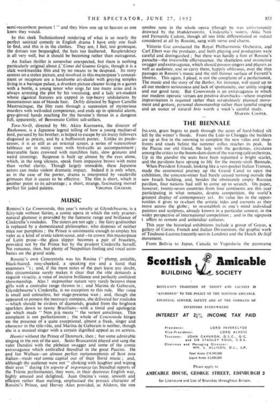MUSIC
Rossini's La Cenerentola, this year's novelty at Glyndebourne, is a fairy-tale without fairies, a comic opera in which the only praeter- natural glamour is provided by the fantastic range and brilliance of Cinderella's roulades. The sisters are not ugly ; the fairy godmother is replaced by a domesticated philosopher, who disposes of neither mice nor pumpkins ; the Prince is unromantic enough to employ his valet as a kind of erotic talent-scout, and—to crown this masterpiece of Latin prose—the glass slipper becomes a pair of bracelets, provided not by the Prince but by the prudent Cinderella herself. No romance, then, but plenty of Neapolitan fooling and vocal acro- batics on the grand scale.
Rossini's own Cenerentola was his Rosina (" plump, amiable, black-haired, rosy-cheeked, a speaking eye and a hand that enamours ") ; and, if the mere notes of the part leave any doubt, this circumstance surely makes it clear that the role demands a roguish vivacity, a voice of incisive brilliance and perfectly confident showmanship. Alas ! stepmother nature very rarely bestows these gifts with a contralto range thrown in ; and Marina de Gabarain, Glyndebourne's Cinderella, is no exception to this rule. Her voice is small and colourless, her stage-presence wan ; and, though she appeared to possess the necessary compass, she delivered her roulades —which should be rivieres of diamonds, graded from the brightest sparklers down to tawny Brazilians—with a timid and apologetic air which made " Non p;ii mesta " the veriest anticlimax. This complaint is not perfectionism ; the whole of Cenerentola hinges on the presence of a quite exceptional, almost a freak, singer and character in the title-role, and Marina de Gabarain is neither, though she is a musical singer with a certain dignified appeal as an actress.
Hamlet without the Prince of Denmark, then ; but some admirable singing in the rest of the cast. Sesto Bruscantini played and sang the valet Dandini with the plebeian swagger and some of the comic extravagance which enthralled Stendhal in the great Paccini. He and Ian Wallace—an almost perfect metamorphosis of Scot into Italian—made real comic capital out of their florid music ; and, although the audience were not " choking with laughter and wiping their eyes " during Un segreto d' itnportanza (as Stendhal reports of the Trieste performance), they were, in their decorous English way, highly amused and delighted. Juan Oncina's voice, smooth and efficient rather than melting, emphasised the prosaic character of Rossini's Prince, and Hervey Alan provided, as Alidoro, the one
sombre note in the whole opera (though he was unfortunately drowned by the thunderstorm). Cinderella's sisters, Alda Non and Fernanda Cadoni, though all too little differentiated or indeed considered at all by Rossini, sang with verve and charm.
Vittorio Gui conducted the Royal Philharmonic Orchestra, a0 Carl Ebert was the producer, and both playing and production we careful and distinguished ; but there was hardly a hint of Rossini's panache—the irresistible effervescence, the shameless and instinctive swagger and extravagance, which should possess singers and players as well as audience, and so carry them, happily oblivious, over the thin passages in Rossini's music and the still thinner surface of Ferretti's libretto. This again, I plead, is not the complaint of a perfectionist. The music and the story of the Barber, for instance, will stand up to all our modern seriousness and lack of spontaneity, our utility singing and our good taste. But Cenerentola is an extravaganza in which our modern operatic virtues are positive drawbacks—where inspired improvisation is required rather than scrupulously planned move- ment and gesture, personal showmanship rather than tasteful singing and an ounce of natural brio worth a week's careful study.
MARTIN COOPER.


































 Previous page
Previous page